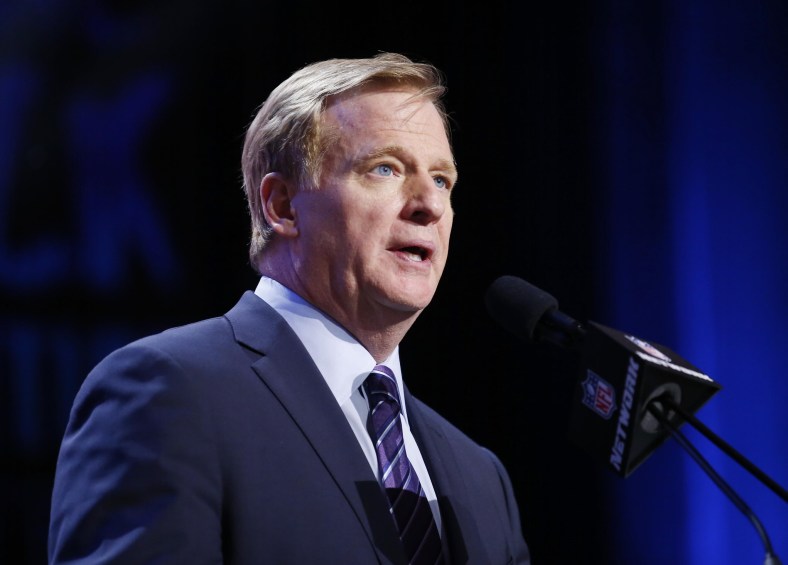
Holding a press conference at this week’s NFL spring meetings, commissioner Roger Goodell had to answer questions involving an Outside the Lines report suggesting that the league attempted to influence a government study on concussions.
Primarily focusing on what seems to be league-mandated PR talking points, Goodell reiterated that concussions remain the NFL’s top priority right now.
That was among the many utter fabrications within the commissioner’s comments.
“I didn’t see the report, we were traveling down here. But I take a much different position than that, on several different fronts,” the embattled commissioner said in Charlotte, via NFL.com. “One, our commitment to medical research is well documented.”
That’s perfectly fine, but the league’s commitment to it’s “own research” is what’s been most well documented.
In the aforementioned Outside the Lines report, investigations into the matter indicated that the NFL withdrew a $16 million commitment to the National Institutes of Health (NIH), only to use that funding for its own research, which is heavily tilted in the league’s favor.
Goodell continued …
“We made a commitment to the NIH. It is normal practice for you to have discussions back and forth with the NIH. We have several members that are advisers on our committees, including Betsy Nabel, including Rich Ellenbogen, who had experience with NIH or worked with the NIH.”
Let’s see how many times Goodell can reference the league’s relationship with NIH. We count four times in that two sentence quote.
The reality of the matter is that the NFL did in fact commit a large amount of cash to the government organization — a commitment that, as the ESPN piece indicated, was not followed through with.
“The NFL was warned that taxpayers would have to bear the cost of the $16 million study and that the NIH would be ‘unable to fund other meritorious research for several years’ if the league backed out,” the report read. “The NFL offered a last-minute, $2 million payment after an intermediary suggested a partial contribution would “help dampen criticism.” The NIH turned down the offer.”
This doesn’t seem as much like back and forth as it does the league forcing NIH into an unattainable situation as it relates to providing objective analysis of the NFL’s concussion issue.
In regards to those Goodell referenced in his Q&A with reporters, he’s definitely overstating said relationships and their direct correlation with the subject at hand.
Nabel was just recently appointed the league’s health and medical adviser lead last March.
Her chosen profession within the medical field is as a cardiologist, not a neurologist. In answering a question regarding this topic on Peter King’s MMQB, Nabel had this to say:
“I think the commissioner and Jeff Miller [the NFL’s senior vice president of health and safety policy] asked me to take this on because I have a track record of thinking broadly around health and wellness, and they were really looking for a strategic advisor who could think very broadly about these issues.”
Think broadly on a topic that includes solely the issue of brain-related long-term health from continual hits to the head? Maybe the NFL’s approach should have been more narrow there.
Obviously, this isn’t to take anything away from Nobel’s accomplishments and qualifications. After all, she is currently the president of Harvard’s Brigham and Women’s Health Care program.
As it relates to Ellenbogen, who is a member of a board within the league’s concussion research program, he’s been somewhat standoffish in terms of correlating hits to the head with Chronic traumatic encephalopathy (CTE).
“We know that repetitive head injury isn’t good, and we know there are long-term effects of traumatic brain injury,” the neurosurgeon said back in 2013. “But to correlate it directly with a particular event has been elusive.”
That’s an interesting comment considering multiple research projects independent of the NFL suggest otherwise.
This is an example of the NFL attempting to draw conclusions based on its own pre-set narrative. That’s the antithesis of objective research and analysis.
For Goodell, the talking point continues to be the league’s willingness to make this concussion issue its top priority.
“Since I became commissioner, this is our No. 1 priority. It’s something we have to do better at,” Goodell continued. “It’s something we have to continue to make progress at to make the game safer for our players at the NFL level.”
Let’s place that comment with all the others that continues to show the NFL is completely out of touch with the reality of the situation. Its top goal is to, and has always been to, make money … and a lot of it.
Most recently, it seems the commissioner’s top priority has been to act as the judge, jury and executioner of the league’s collective bargaining issue, primarily player punishment.
Sadly, Goodell’s comments in response to the Outside the Lines report can’t be seen as anything more than white noise to the players currently impacted on the field and those who have suffered through long-term brain-related issues.
Until the NFL shows itself to be open to dialogue with those who disagree with its findings. Until the league decides that objective analysis of the problem is needed.
Until this happens, the league will continue to find itself under fire from an increasingly skeptical American public.